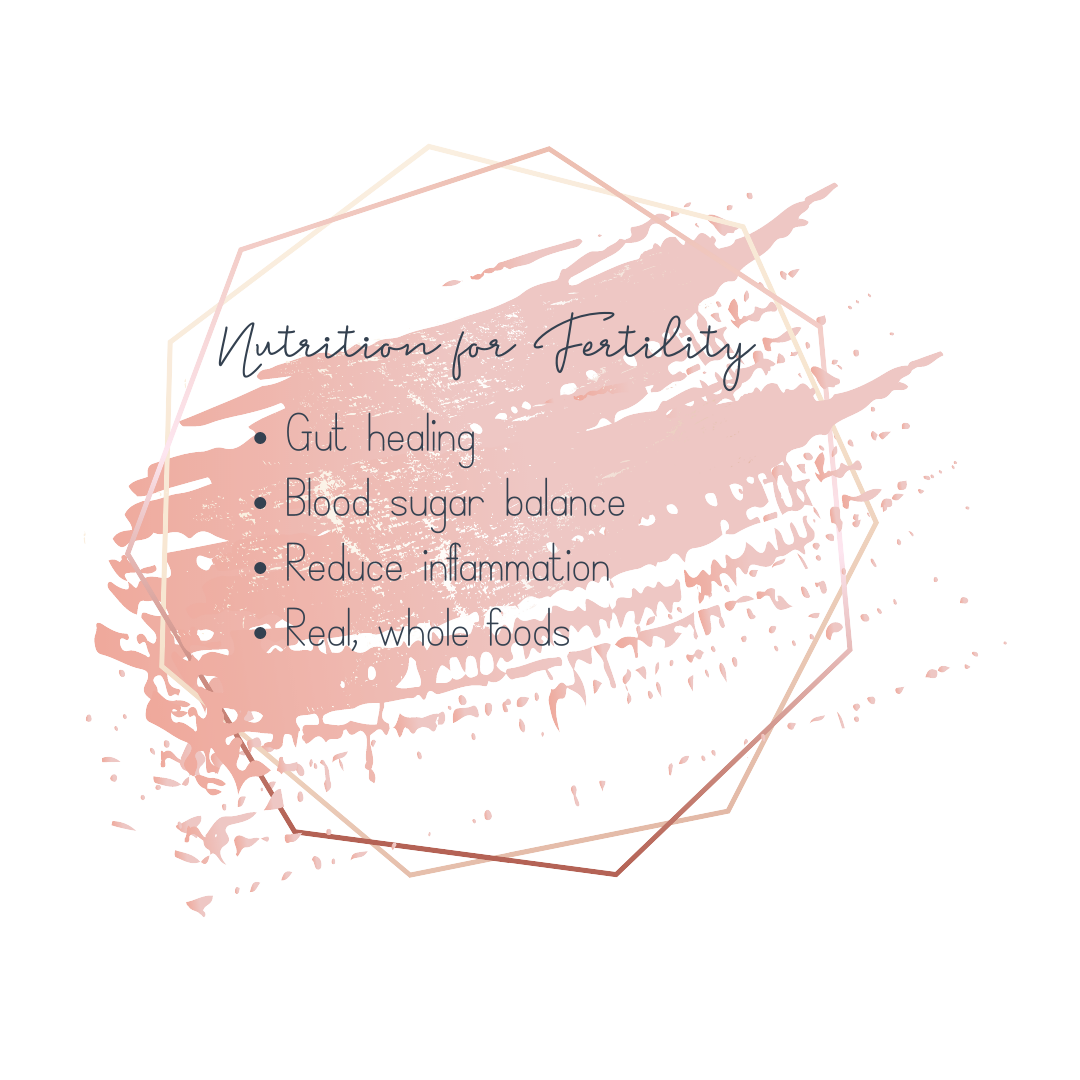Fueling Fertility
When it comes to conceiving, there are plenty of things you don’t have much control over, but your diet is one element that you not only have control over, but that plays a massive role in improving (or damaging) your chances of conceiving. Remember that old adage, “you are what you eat”? Well, you are what you don’t eat, too. In other words, if you eat processed foods, foods that encourage inflammation, or foods lacking in nutrients, your body is going to have quite a tough time supplying quality eggs and sperm to try to make a baby. When I talk to my kids about nutrition, we talk about how smart our body is, how it’s quite capable of most things, from keeping us from getting sick in the first place, to battling off an infection or healing a boo-boo. But we also discuss how it needs the right fuel to do those jobs. Just like you’re going to have one heck of a time making a cake if you don’t have flour, eggs, or butter, you and your partner are going to struggle to produce a healthy baby if you don’t have the best or right “ingredients”. So, let’s dive in; how does the food you eat impact the baby you want to make?
It Starts in the Gut
One of the big influences on hormone health and overall health is your gut health. By that, I don’t get mean a lack of digestive symptoms (although those can be a good indicator something is amiss), but the health of the bacteria and fungi in your large intestine collectively known as the microbiome. Specific to the reproductive hormones is a subsect of the microbiome called the Estrobolome. The Estrobolome helps regulate estrogen levels, marking them for excretion from the system or to be re-circulated. The problem is, if your bacterial balance is off, so, too can this mechanism, allowing excess estrogen to go back into circulation and wreak hormone-balance havoc. Fermented foods and probiotics are two helpful additions to assist in rebalancing the gut, but they’re just the tip of the iceberg. Remember, too, that birth control pills not only deplete vital nutrients essential for healthy eggs and pregnancy, but they also disrupt the microbiome.
Dysbiosis, or the imbalance of the microbiome, can also be from a myriad of other things, including antibiotic use, poor diet, and inflammation. And dysbiosis itself encourages inflammation! And inflammation = stress = unhealthy/unhappy hormones and eggs. We’ll talk more about it in the next post, but suffice to say that stress tells the body now is not a good time to add a new life to the mix and your body reacts accordingly to make it unlikely to happen. This dysbiosis can cause digestive issues and also interfere with nutrient absorption. If you’re coming off of birth control or if you recently had a baby (within the past 18 months), nursed said baby, and/or didn’t do a good job replenishing your nutrients stores post-baby, you’re already likely to be nutrient deprived; having a digestive system that’s struggling to absorb nutrients is only going to make things worse. Additionally, the inflammation itself depletes nutrients, increases cortisol (a stress hormone meant for acute stress, not chronic), and consequently, blood sugar levels. All of these things lead to unhealthy hormones and unhealthy eggs (and sperm) and decreased chances of conception.
The microbiome and digestive tract is also necessary for proper detoxification. I mentioned the function of removing excess estrogen, but it also works to remove toxins from the body in general. One of the key things I work on with clients is ensuring DAILY bowel movements. Yep, that’s right, if you’re not pooping 1-2 times a day, you should be doing some definite work! You wouldn’t leave a trash bag full of raw meat sitting around for several days, right? That’s gross! Yea, so is “leaving” waste in your own body for several days!
If all of that wasn’t enough to convince you of the super significance of a healthy microbiome, get this. The placenta, that wonderful organ your body grows to nourish baby during pregnancy, has its own, unique microbiome. Research is still quite scarce and in its infancy, but the microbiome health of the gut is thought to impact other microbiomes in the body, like the placenta during pregnancy. And the balance of the placental microbiome has become a topic of interest around pregnancy outcomes like pre-eclampsia and miscarriage.
Blood Sugar Balance & Reducing Inflammation
Remember, egg & sperm quality are massively impacted by inflammation. When your body is stressed, inflammation is produced in response. Inflammation is a natural, healthy part of the healing process. The problem? When we’re chronically stressed, we have chronically high cortisol, which also means increased blood glucose. And high blood sugar, whether from stress or poor diet, encourages both inflammation and impedes proper hormone balance. PCOS, in fact, is thought to be related to insulin resistance, which is typically a response to chronically elevated glucose levels. In other words, if your blood sugar isn’t balanced, neither are your hormones, which makes it quite difficult to get pregnant, stay pregnant, or have a healthy pregnancy.
What foods increase blood sugar levels? Carbs. And yes, while fruits and vegetables are carbs and can cause a slight uptick in blood sugar, they’re really not the carbs we’re talking about here. Fruits and vegetables also contain a ton of nutrients and fiber, the latter of which helps not only stabilize blood sugar levels, but nourishes a healthy microbiome. Believe it or not, there’s really no physiological “need” for carbs. Your body is capable of making glucose/energy from protein and fat, if necessary. So the idea that 50+% of your calories need to come from carbohydrates? Yea, just not true. The goal is to achieve balanced blood sugar levels, not huge spikes and dips. Excess/high blood glucose increased inflammation and alters hormone balance (insulin is a hormone!). When your body is constantly trying to mobilize excess glucose/sugar from the blood stream into the cells, the body must also pump out a LOT more insulin to get the desired response, which can lead to insulin resistance. Think of it this way. Your body wants to keep your blood sugar levels balanced. In order to move glucose from the blood into the waiting tissues and muscles, insulin is required to “open” the door. When the tissues and cells in the body are already happy and satisfied, they have no real interest in opening their doors, so insulin has to ramp up, knocking louder and louder, to get blood sugar levels stable. This means more insulin gets pumped out to do what should take only one knock on the door.
Increased Insulin = Increased Inflammation = DECREASED sperm/egg quality/disrupts ovulation and hormone balance
To decrease inflammation, then, we want to address gut healing and blood sugar balance. To do the former, removing food sensitivities and providing fermented foods and lots of fiber is a great place to start. To do the latter, whole foods, avoiding processed foods, and focusing on fruits and veggies as your carbs with lots of good fat and protein is idea.
Do’s and Don’ts
Do:
Increase fruits and vegetables
Increase fermented foods
Increase specific nutrients (DHA, choline, folate, vitamin D, magnesium)
Don’t
Eat a lot of processed foods
Consume excess caffeine (ideally 200mg MAX)
Drink more than 1-2 drinks per week of alcohol
Eat foods with trans fats
The ins and outs of good fertility nutrition isn’t a one-size fits all. But the key points are that 1) your nutrition absolutely can impact your sperm/egg health and ability to conceive, 2) needs to focus on real, whole foods, and 3) must address underlying imbalances in gut health, inflammation, blood sugar balance, and nutrient deficiencies. Good news is, the ideal way to eat to conceive a baby is also pretty much the ideal way to eat during pregnancy and postpartum! So the sooner you get started, the better.




